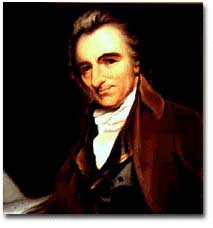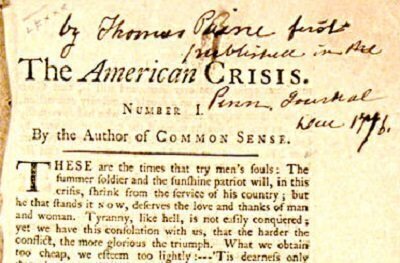Mẹo Which of the following statements about Thomas Paines the American Crisis is accurate
Mẹo về Which of the following statements about Thomas Paines the American Crisis is accurate Chi Tiết
Hoàng Gia Trọng Phúc đang tìm kiếm từ khóa Which of the following statements about Thomas Paines the American Crisis is accurate được Update vào lúc : 2022-11-11 15:22:04 . Với phương châm chia sẻ Bí quyết về trong nội dung bài viết một cách Chi Tiết Mới Nhất. Nếu sau khi tham khảo tài liệu vẫn ko hiểu thì hoàn toàn có thể lại Comment ở cuối bài để Mình lý giải và hướng dẫn lại nha. Nội dung chính Show
Nội dung chính Show - Common SenseA Real Paine for the BritishWhat was Thomas Paine's message in The Crisis?What effect does Thomas Paine hope The American Crisis will have on readers?What was the purpose of The American Crisis?How did Thomas Paine's American Crisis Impact the American Revolution?

Thomas Paine
Americans could not break their ties with Britain easily. Despite all the recent hardships, the majority of colonists since birth were reared to believe that England was to be loved and its monarch revered.
Fear was another factor. Any student of history was familiar with the harsh manner the British employed on Irish rebels. A revolution could bring mob rule, and no one, not even the potential mob, wanted that. Furthermore, despite taxes, times were good. Arguments can be made that average American was more prosperous than the average Briton.
Yet there were the terrible injustices the colonists could not forget. Americans were divided against themselves. Arguments for independence were growing. Thomas Paine would provide the extra push.
Common Sense
Common Sense was an instant best-seller. Published in January 1776 in Philadelphia, nearly 120,000 copies were in circulation by April. Paine's brilliant arguments were straightforward. He argued for two main points: (1) independence from England and (2) the creation of a democratic republic.
Paine avoided flowery prose. He wrote in the language of the people, often quoting the Bible in his arguments. Most people in America had a working knowledge of the Bible, so his arguments rang true. Paine was not religious, but he knew his readers were. King George was "the Pharaoh of England" and "the Royal Brute of Great Britain." He touched a nerve in the American countryside.

A Real Paine for the British
Beside attacks on George III, he called for the establishment of a republic. Even patriot leaders like Thomas Jefferson and John Adams condemned Paine as an extremist on the issue of a post-independence government. Still, Common Sense grew the patriot cause. It made no difference to the readers that Paine was a new arrival to America. Published anonymously, many readers attributed it to John Adams, who denied involvement.
In the end, his prose was common sense. Why should tiny England rule the vastness of a continent? How can colonists expect to gain foreign support while still professing loyalty to the British king? How much longer can Americans stand for the repeated abuses of the Crown? All these questions led many readers to one answer as the summer of 1776 drew near.
The publication of Thomas Paine’s Common Sense caused a sensation in early 1776 as it explained the need for freedom. But it was a second series of pamphlets published on December 19 of that year that inspired a huge American military victory.

“These are the times that try men’s souls: The summer soldier and the sunshine patriot will, in this crisis, shrink from the service of their country; but he that stands it now, deserves the love and thanks of man and woman. Tyranny, like Hell, is not easily conquered; yet we have this consolation with us, that the harder the conflict, the more glorious the triumph,” said Paine in The American Crisis, a new pamphlet that appeared in the Pennsylvania Journal.
Four days later, like a modern-day football coach seeking to inspire his team, General George Washington had Paine’s words read out loud to his troops McConkey’s Ferry on the Delaware River. Paine had written the words during the army’s retreat from Tp New York.
The army’s commanders read the words to a force that include John Marshall, Alexander Hamilton, James Monroe, and Aaron Burr.
Washington was literally a crossroads. His opponent, General Howe, had offered pardons to local residents, and the re-enlistment period was ending for the volunteers in his army.
An inspired Washington and his troops, who adopted the motto “Victory or Death,” crossed the Delaware River during a Nor’easter on Christmas Day and routed the Hessian garrison Trenton.
The much-needed victory galvanized the Revolutionary forces and the Continental Congress. Troops decided to re-enlist as Washington’s forces won a second battle Trenton and a key engagement Princeton.
While The American Crisis did much to inspire the troops, its fame was nowhere near that of Common Sense, which was essentially the first viral mass communications sự kiện in America.
The first version of Common Sense went viral, in the current sense of the word, when it hit the cobblestone streets of Philadelphia on January 9, 1776.
Common Sense sold 120,000 copies in its first three months, and by the end of the Revolution, 500,000 copies were sold. The estimated population of the Colonies (excluding its African-American and Native American populations) was 2.5 million.
So, about 20 percent of colonists owned a copy of the revolutionary booklet. In current-day sales, that would amount to sales of 60 million, not including overseas sales.
Link: Read Common Sense
In the case of Common Sense, the publicity was literally word of mouth, since people would buy the pamphlet and shout the words on street corners and inside taverns for the illiterate to hear.
Paine was born and raised in England, and he had been in Philadelphia for little more than a year, after getting a letter of recommendation from Benjamin Franklin.
He published Common Sense anonymously, and its simple words made the case for the Colonies’ separation from England, in no uncertain terms.
In his later years, Paine would become a controversial figure because of his writings on religion and his role in the French Revolution; only a handful of people attended his funeral in 1809.
President Thomas Jefferson had permitted Paine to return from France in his final years and wrote about the author in 1821:
“No writer has exceeded Paine in ease and familiarity of style, in perspicuity of expression, happiness of elucidation, and in simple and unassuming language,” Jefferson said. “In this he may be compared with Dr. Franklin; and indeed his Common Sense was, for a while, believed to have been written by Dr. Franklin, and published under the borrowed name of Paine, who had come over with him from England.”
What was Thomas Paine's message in The Crisis?
Paine encourages the colonists to value victory and its consequent freedom because “the harder the conflict, the more glorious the triumph”—“what we obtain too cheap, we esteem too lightly,” he notes, and “ it is dearness only that gives every thing its value.” Crisis No.What effect does Thomas Paine hope The American Crisis will have on readers?
What effect does Thomas Paine hope The American Crisis will have on readers? He hopes it will inspire them to keep fighting for independence.What was the purpose of The American Crisis?
When the rebellion almost seemed lost, Thomas Paine, American soldier and author of "Common Sense," wrote a series of essays, "The American Crisis" to bolster morale among American soldiers and renew hope in the American cause.How did Thomas Paine's American Crisis Impact the American Revolution?
By promoting the idea of American exceptionalism and the need to form a new nation to realize its promise, Paine's pamphlet not only attracted public support for the Revolution, but put the rebellion's leaders under pressure to declare independence. Tải thêm tài liệu liên quan đến nội dung bài viết Which of the following statements about Thomas Paines the American Crisis is accurate
Post a Comment